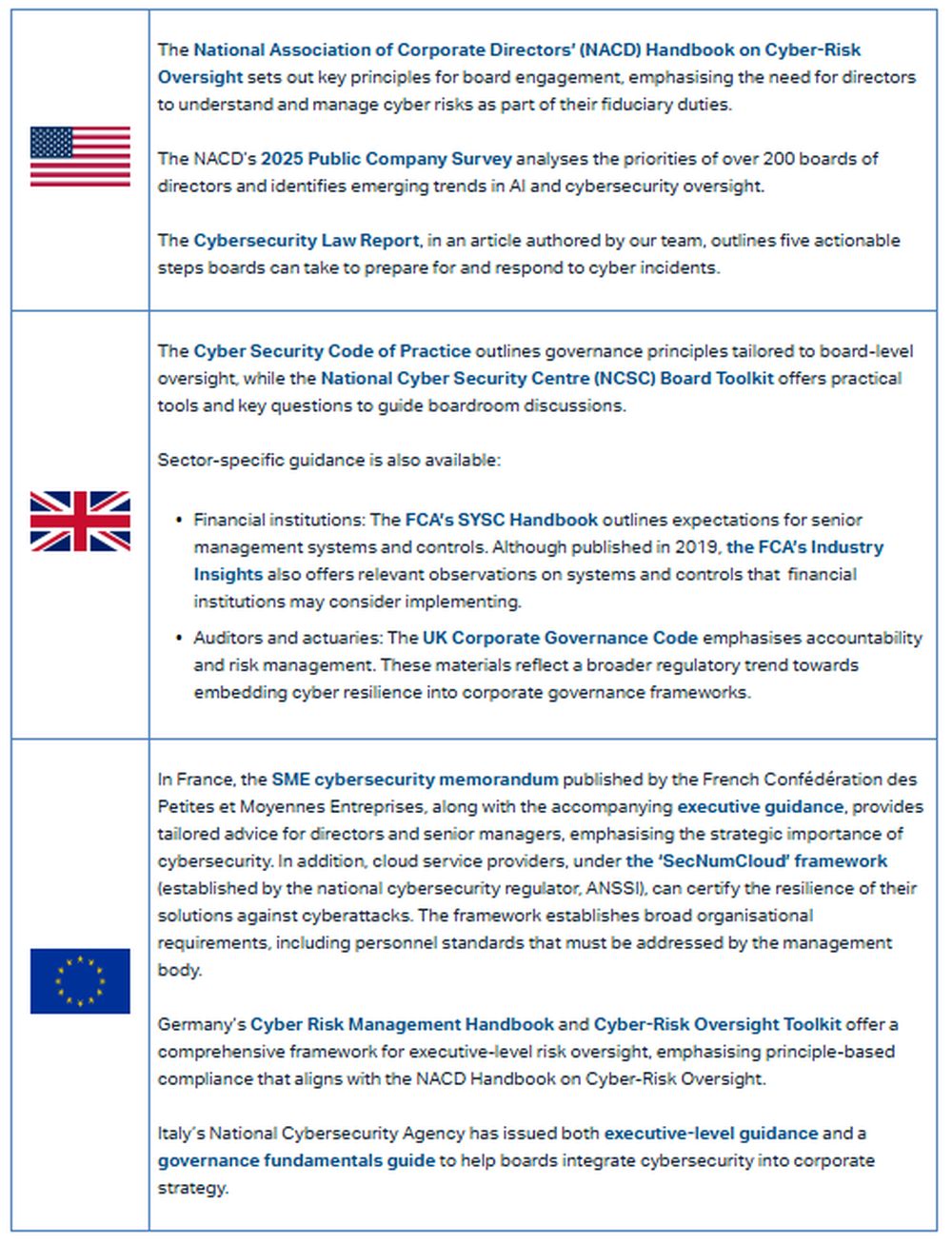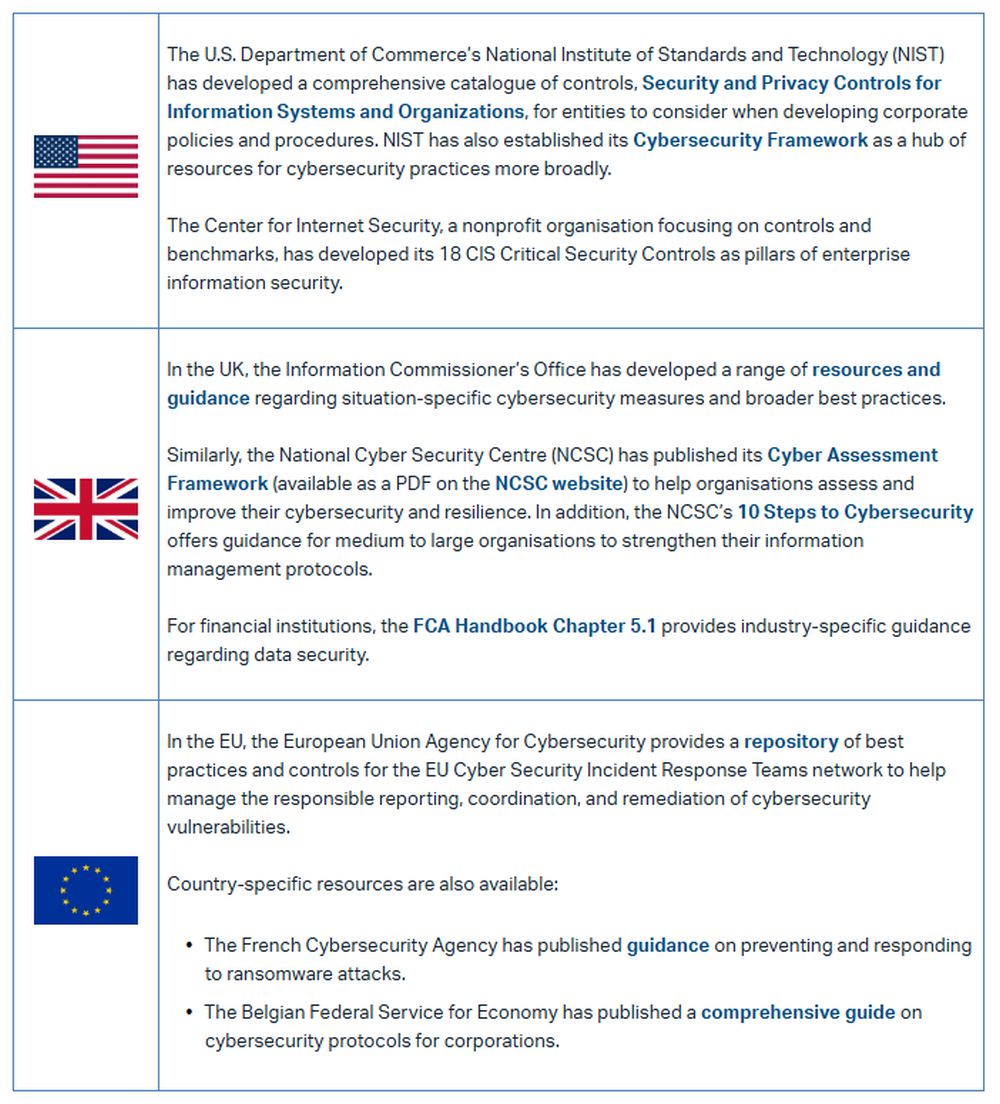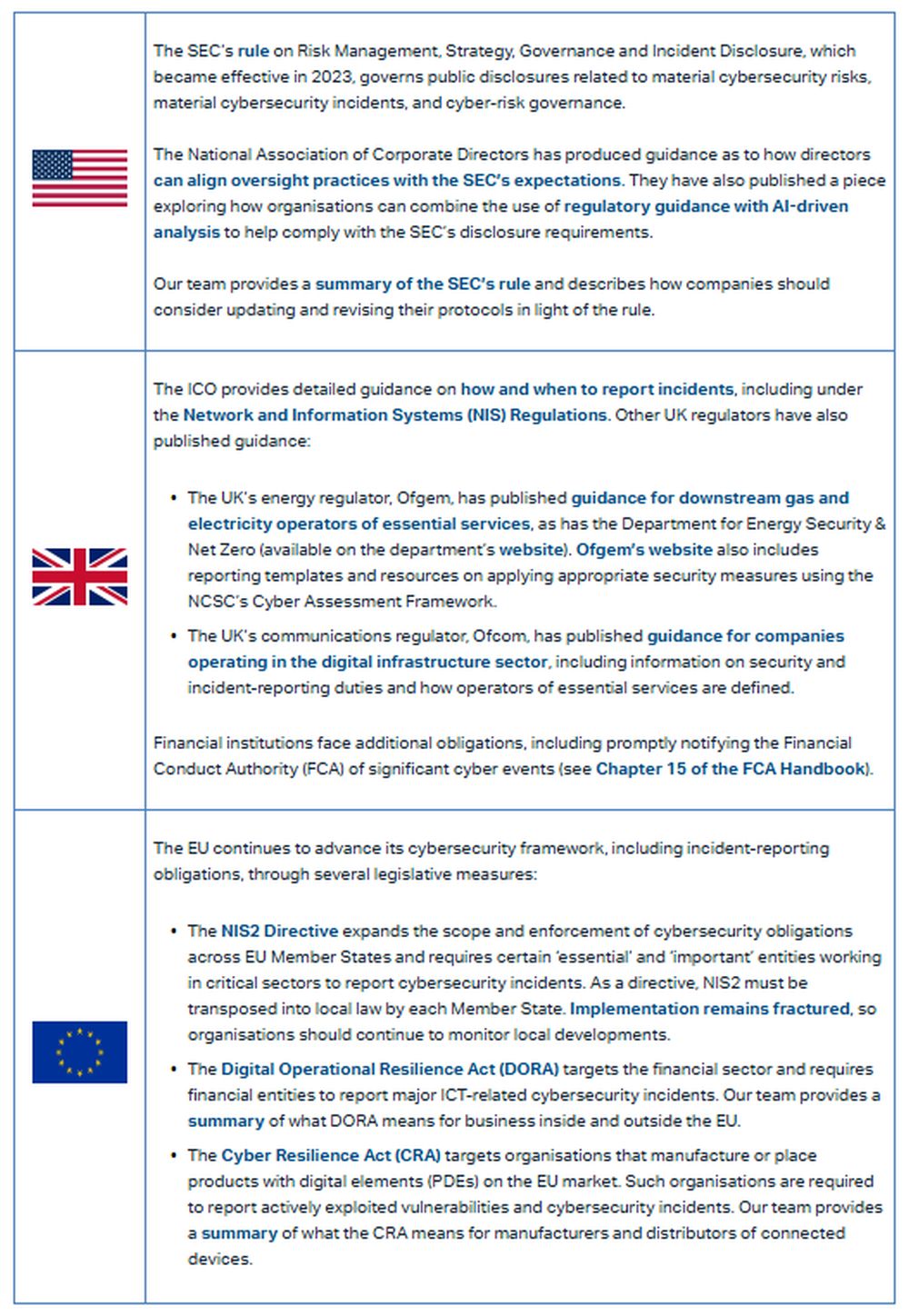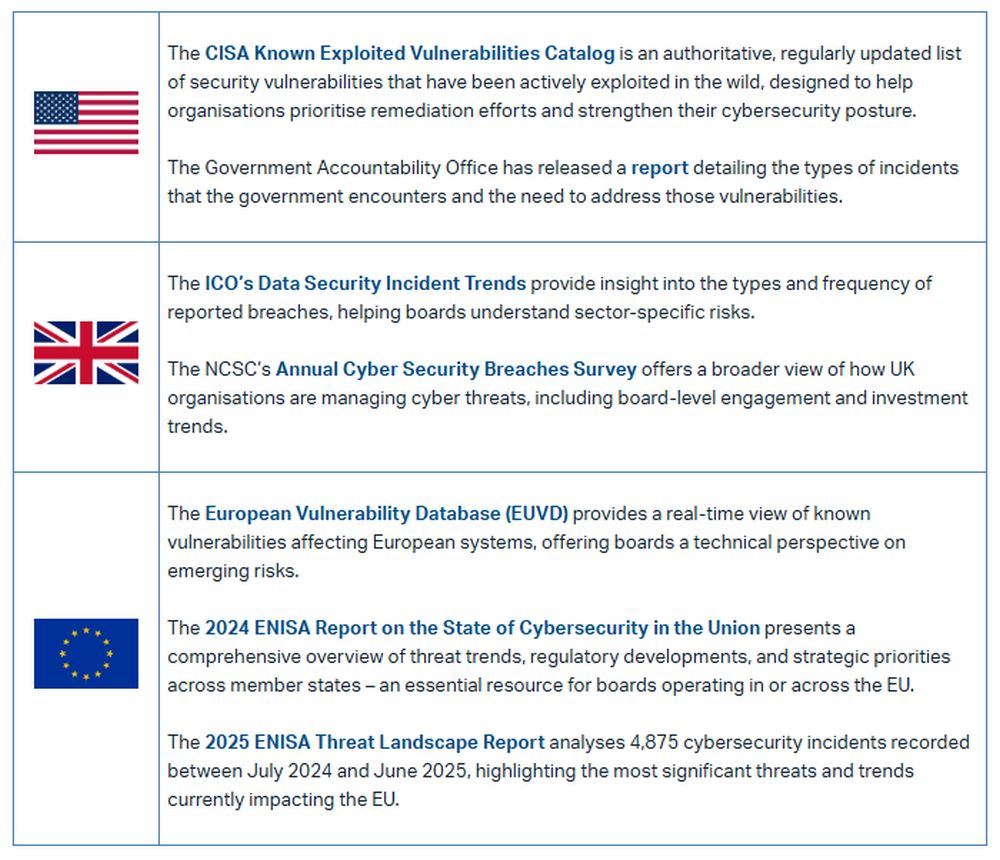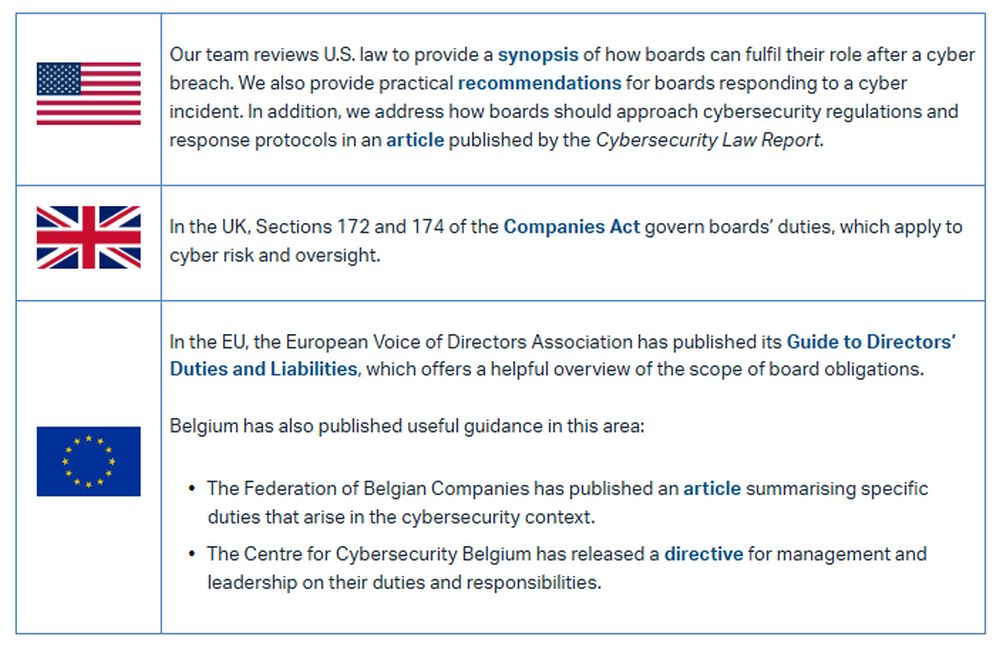- within Technology topic(s)
- in South America
- in South America
- in South America
- in South America
- within Privacy, Food, Drugs, Healthcare and Life Sciences topic(s)
- with readers working within the Insurance and Securities & Investment industries
Executive Summary
Boards in the United States, United Kingdom, and European Union face increasing pressure to oversee cybersecurity risks amid evolving regulatory expectations. Our Privacy, Cyber & Data Strategy Team highlights key resources, frameworks, and reporting obligations shaping board-level cybersecurity governance across jurisdictions.
- Explores U.S., UK, and EU guidance on board-level cybersecurity governance
- Identifies emerging regulatory trends and reporting requirements
- Provides practical tools to strengthen oversight and resilience
Boards across the United States, United Kingdom, and European Union are under growing pressure to demonstrate effective oversight of cybersecurity risks. As incidents become more frequent and impactful, boards must not only understand their responsibilities but also stay informed about evolving legal obligations, best practices, and governance expectations.
Earlier this year, the French national cybersecurity regulator (ANSSI) hosted a first-of-its-kind tabletop exercise involving over 5,000 professionals from 1,000 public and private organisations. The event underscored the critical need for companies and their leadership teams to embed robust crisis-management strategies to prepare for and respond to cybersecurity incidents.
Cybersecurity resources, frameworks, and regulatory developments are increasingly relevant to boards that oversee operations in the U.S., UK, and EU. Practical guidance, legal requirements, and emerging trends continue to shape how boards should approach cyber-risk management, incident response, and disclosure obligations. By synthesising materials from government agencies, industry bodies, and legal experts, this resource aims to support directors in better fulfilling their fiduciary duties and enhancing organisational resilience in the face of cyber threats.
General Guidance for Boards
Cybersecurity oversight has become a core boardroom issue in the U.S., UK, and EU, driven by regulatory developments and heightened expectations around risk governance. Several board-level professional associations have published guidance for directors on implementing and overseeing their organisations' cybersecurity programs. In the UK, government bodies and regulators have issued resources to help boards navigate their cybersecurity responsibilities, while across the EU, national cybersecurity agencies have developed targeted resources to support board-level engagement with cyber risk. Collectively, these resources reflect a growing recognition that cybersecurity is not merely a technical issue but a core component of corporate governance and organisational resilience.
Security Controls
In the wake of high-profile data breaches over the last decade, organisations are not only encouraged but often required to maintain safeguards that protect internal, proprietary, and customer data. They must implement technical defences against cyberattacks and educate employees on cybersecurity best practices. Accordingly, all organisations should adopt certain policies to prevent cyber incidents, as well as industry-specific measures to protect highly sensitive consumer records and information. Government entities in the U.S., UK, and EU have published control frameworks that organisations can use to minimise vulnerabilities, safeguard confidential information, and protect customers, corporate integrity, and business.
Cyber Reporting and Disclosure Obligations
Cybersecurity reporting obligations are a regulatory priority across the U.S., UK, and EU, with increasing regulatory expectations for transparency, resilience, and board-level accountability. Reporting requirements are increasingly stringent, often requiring rapid notification of significant cyber events to national authorities, sector regulators, and, in some cases, affected stakeholders. Sector-specific and product-level responsibilities are also expanding, particularly in financial services and digital product manufacturing, where organisations must report vulnerabilities and operational disruptions. Boards should remain informed about these evolving disclosure and reporting requirements and proactively ensure that their organisations are prepared to respond to developing reporting and disclosure obligations.
Cyber Trends
Most jurisdictions track the evolving cyber threat landscape through a combination of regulator data and industry research. In the U.S. and EU, these trends are centralised in databases. In the UK, annual surveys and regulator trends are published to help organisations understand and better protect against cyber risks. Whilst particularly useful for security and IT personnel, these resources also enable boards to gain a clear understanding of the cyber threat landscape and associated cyber risks.
Board Liability
As attempted cyberattacks and data breaches become a routine expectation rather than an anomaly in the corporate environment, boards may be exposed to potential liability arising from their actions before and after a cybersecurity incident. Board liability varies across the U.S., UK, and EU.
In the UK, for example, directors owe general duties to an organisation under the Companies Act which would apply when managing a cybersecurity incident. Directors must act in good faith, promote the success of an organisation, exercise independent judgment, and avoid conflicts of interest.
In the U.S., directors are bound by their fiduciary duties to act in the best interests of an organisation, place the interests of the organisation above their own, ensure the organisation has systems in place to monitor potential risks, and respond appropriately to any red flags indicating significant cyber risks. Accordingly, boards should be aware of their obligations to institute management training for cybersecurity incidents, oversee the execution of response protocols, and report on outcomes. Equally important, boards should recognise when failure to do so may result in director liability.
The importance of cybersecurity oversight for boards in the U.S., UK, and EU continues to grow. As cyber threats evolve and regulations tighten, boards must remain informed and be proactive in managing cyber risks. Leveraging resources from government agencies, industry bodies, and legal experts can enhance both the understanding and execution of cybersecurity responsibilities. Doing so helps ensure compliance and strengthens organisational resilience, making effective cybersecurity governance an essential component of corporate strategy and risk management in today's digital environment.
The content of this article is intended to provide a general guide to the subject matter. Specialist advice should be sought about your specific circumstances.

